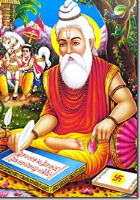Mandodari's Lament And The Funerals Poem by Valmiki
Mandodari's Lament And The Funerals
'Hast thou fallen,' wept in anguish Ravan's first and eldest bride,
Mandodari, slender-waisted, Queen of Lanka's state and pride,
'Hast thou fallen, king and consort, more than Gods in warlike might,
Slain by man, whom bright Immortals feared to facein dubious fight?
Not a man!-the Dark Destroyer came to thee in mortal form,
Or the heaven-traversing VISHNU, INDRA ruler of the storm,
Gods of sky in shape of Vanars helped the dark and cruel deed,
Girdling round the Discus-Wielder in the battle's direst need!
Well I knew,-when Khara, Dushan, were by Rama's prowess slain,
Rama was no earthly mortal, he who crossed the mighty main,
Well I knew,-when with his army he invested Lanka's gate,
Rama was no earthly mortal but the messenger of Fate,
And I prayed,-the faithful Sita, might unto her consort go,
For 'tis writ that nations perish for a righteous woman's woe,
But for impious lust of woman,-all forgetful of thy wife,
Thou hast lost thy crown and kingdom, thou hast lost thy fated life!
Woe to me! the sad remembrance haunts my tortured bosom still,
Of our days on famed Kailasa or on Meru's golden hill,
Done the days of joy and gladness, Mandodari's days are done,
Since her lord and king and husband from her dear embrace is gone!
Sorely wept the Queen of Lanka; Rama, tender, tearful, true,
Bade the funeral rites and honours to a fallen foeman due,
And they heaped the wood of Chandan and the fragrant garland laid,
On the pyre they lifted Ravan in the richest robes arrayed,
Weeping queens and sorrowing Rakshas round their fallen leader stood,
Brahmans with their chaunted mantras piled the dry and scented wood,
Oil and cords and sacred offerings were upon the altar laid,
And a goat of inky darkness as a sacrifice was slayed.
Piously the good Bibhishan lighted Ravan's funeral pyre,
And the zephyrs gently blowing fanned the bright and blazing fire,
Slow and sad with due abititions mourners left the funeral site,
Rama then unstrung his weapon, laid aside his arms of might.
CONDENSED INTO ENGLISH VERSE
By Romesh C. Dutt (1899)
EPIC OF RAMA, PRINCE OF INDIA
BOOK X
YUDDHA
(The War in Ceylon)
This poem has not been translated into any other language yet.
I would like to translate this poem
In the legend of Rama and Sita, which was written by Valmiki in the sixth century B.C., the hero is a mixture of types. Rama seems saintly in going into exile, full of consideration for everyone. When Sita is abducted, however, he becomes a great violent warrior determined to annihilate the enemy. Originally a loving husband, he treats Sita badly to prove her virtue. Finally, he returns home to rule as king. In this combination of holy man, warrior, scornful husband, king, and a god's incarnation one sees the diverse aspirations of Indian society transformed into a plausible hero. [Cliff Notes]